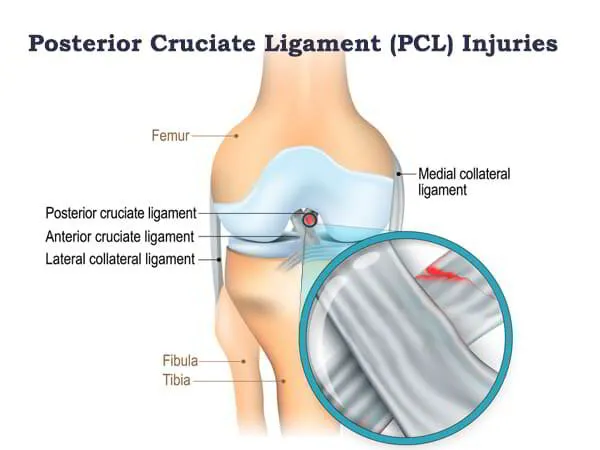PCL Reconstruction Surgery
Home / Area of Specialty / Knee / PCL Reconstruction Surgery
Dr. Pradyumna R carefully evaluate your conditions and symptoms associated to your knee pain and injuries, based on the diagnostic report and scan he would suggest if so, you are a candidate for PCL Reconstruction Surgery procedure, he is an highly experienced knee treatment specialist provides diagnosis as well as surgical and nonsurgical treatment options at Bangalore Orthopaedic Clinic, in BTM Layout, Bangalore.
If you have any queries or would like to schedule an appointment for PCL Reconstruction Surgery procedure or knee pain or knee injury treatment consultation please call +919113025188.
What is Posterior Cruciate Ligament (PCL) Injuries?
The posterior cruciate ligament (PCL) is a ligament located on the inside of your knee - behind the anterior cruciate ligament. It connects your shin bone to your thigh bone. The PCL helps keep your shin bone from moving backward with respect to your thigh bone. A torn PCL may result from a severe twisting injury, falling on an outstretched knee, or injuring the knee during contact sports." It can be mildly damaged, partial tear or complete tear of the ligament.
What causes PCL injuries?
Over-extension and hyper-flexion of the knee are some of the main causes of a PCL injury. Most PCL injuries occur during high-impact sports and automobile accidents, though an individual may develop knee pain when participating in activities that involve a lot of heavy activity, such as competitive sports.
What is PCL Reconstruction Surgery?
PCL reconstruction surgery involves repairing a damaged knee with tissue graft taken from another part of the body, or a donor.
What are the symptoms of PCL Injuries?
A PCL tear can be tough to diagnose at first. You may feel a snap and then pain and swelling will occur in your knee. You will find it difficult to walk or bear any weight on your knee. The knee may feel unstable, like it is going to give way at any time.
What are the tests to diagnosis of PCL Injuries?
To diagnose your condition, your doctor will evaluate your medical history, the way your knee looks and feels, and may order other tests. X-rays are helpful for finding out if you have an injury such as an avulsion fracture (where the PCL tears off a piece of bone) or a tear in the tissue around the knee joint. Both of these injuries can show up on an X-ray. An MRI scan can give your doctor good images of soft tissues like ligaments and tendons.
What are the treatments for PCL Injuries?
Non-Surgical treatments
Numerous options are available for the treatment of pcl injuries. These include non surgical and surgical treatment. Non surgical treatment involves the use of ice, rest, compression and elevation of the knee, along with physical therapy to strengthen the knee muscles and restore motion. A knee brace may be employed in order to immobilize the knee. Crutches may be used to prevent weight bearing to allow the bone and soft tissues time to heal.
Surgical Procedure
When a posterior cruciate ligament (PCL) is completely torn, your doctor may opt for posterior cruciate ligament reconstruction, or PCL reconstruction. In this procedure, the injured ends of your PCL are restored by attaching a healthy tendon to the bone using wire anchors and screws. The graft is harvested from another part of the body, or from a cadaver.
Posterior cruciate ligament (PCL) reconstruction surgery is performed using a minimally invasive technique. When compared to open surgery, arthroscopy has shown to result in a significantly shorter hospital stay and fewer postoperative complications.
PCL reconstruction continues to evolve as many surgeons dedicate their practices to these advanced techniques. The surgery is now performed with one incision allowing for faster recovery time and resuming normal activities sooner.
Postoperative Care after PCL Injuries
Rehabilitation plays a vital role in the treatment of posterior cruciate ligament injuries. A physical therapy program will help you regain knee strength and motion.
If you had surgery, physical therapy will begin 1 to 4 weeks after your procedure.
What are risks and complications?
A residual incongruity can lead to irritation, inflammation, and pain at the revision surgery site.
Other complications that may occur include nerve and blood vessel damage, failure of the graft, loosening of the graft, loss of knee stability, pain from the incision site or infection.
For more information on posterior cruciate ligament reconstruction or repair or knee ligament injury and the treatment options available, please call +919113025188 Dr. Pradyumna R, Orthopaedic knee specialist serving BTM Layout, Bangalore City.

